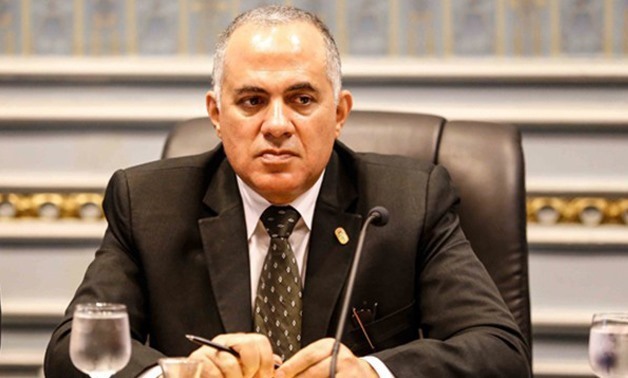
FILE - Egyptian Minister of Water Resources and Irrigation Mohamed Abdel-Aty
CAIRO – 11 January 2018: Upon the request of House of Representatives' MPs, Minister of Water Resources and Irrigation Mohamed Abdel Aty reviewed the ministry's national strategic plan for water conservation to overcome the water shortage Egypt suffers from, in a general session before the parliament on Wednesday.
Abdel Aty stated that the ministry’s water conservation plan depends on a four axis vision, including spreading awareness, rationalization of consumption, resource development, and the creation of an appropriate environment.
Regarding the rationalization of consumption, the ministry is currently reviewing a study to replace strains of agricultural crops which consume large amounts of water with crops that consume less water and produce higher yields, according to Abdel Aty.
The minister called on all Egyptians to preserve every drop of water, pointing out that citizens bear a great responsibility in rationalizing the consumption of water. If a citizen has only one water tank, he will take great care of every drop of water.
The state spends around LE 70 billion on water purification, which is one of the main reasons to rationalize the use of water.
When asked about the Grand Ethiopian Renaissance Dam, Abdel Aty said, “We have to know that Egypt is working seriously and decisively on the Renaissance Dam issue.”
On raising fines for rice cultivation and allowing farmers to grow rice, Abdel Aty stressed that it is not permissible to cancel the rice fines as the farmers consume 8,000 cubic meters of water per rice feddan, while only 2,000 cubic meters of water are consumed per wheat feddan.
Talking about resource development, as one of the points of the water conservation plan, Abdel Aty stated that the ministry is currently working to construct water desalination plants in all governorates. He added that the ministry constructed a number of reservoirs to store flood water.
Moreover, the ministry is considering cultivating strategic crops in the Nile basin countries. However, moving the crops from the Nile basin countries to Egypt requires more cost-effective means of transport and therefore an upgrade of the Nile transport system is a must.
“We are trying to be more dynamic in our work that is why the ministry witnessed the transfer of 28 leaders from their posts in the last week, giving more dynamic elements the opportunity to deal with the problems on the ground," the minister of water resources and irrigation said in a speech at the parliament's plenary session on Wednesday.

Comments
Leave a Comment